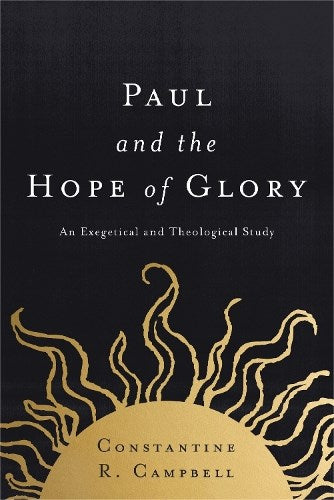FREE DELIVERY ON ORDERS OVER £25
ALWAYS UP TO 70% OFF RRP
SIGN UP FOR OFFERS AND EXCLUSIVES


Paul and the Hope of Glory: An Exegetical and Theological Study (Paperback)
Constantine R. Campbell (Author)
- £16.00
-
£26.00 - £16.00
- Unit price
- per
Save £10.00
Please hurry! Only 3 left in stock
10 customers are viewing this product
Couldn't load pickup availability
Free Shipping
Free standard shipping on orders over £25
Same day dispatch.
Free Returns
Learn More.
- Publisher: Zondervan Academic
- ISBN: 9780310521204
- Pages: 528
- Weight: 0.562
Constantine R. Campbell (PhD, Macquarie University) is a New Testament scholar, author, musician, and documentary host, and lives in Canberra, Australia. He was formerly professor of New Testament at Trinity Evangelical Divinity School and is the author of several books, including Paul and Union with Christ, Advances in the Study of Greek, Basics of Verbal Aspect in Biblical Greek, Keep Your Greek, Outreach and the Artist, and 1, 2 & 3 John in The Story of God Bible Commentary series.
Related Products
Example product title
- £16.00
-
£26.00 - £16.00
- Unit price
- per
Save £10.00
Example product title
- £16.00
-
£26.00 - £16.00
- Unit price
- per
Save £10.00
Example product title
- £16.00
-
£26.00 - £16.00
- Unit price
- per
Save £10.00
Example product title
- £16.00
-
£26.00 - £16.00
- Unit price
- per
Save £10.00
Example product title
- £16.00
-
£26.00 - £16.00
- Unit price
- per
Save £10.00
Example product title
- £16.00
-
£26.00 - £16.00
- Unit price
- per
Save £10.00
Example product title
- £16.00
-
£26.00 - £16.00
- Unit price
- per
Save £10.00
Example product title
- £16.00
-
£26.00 - £16.00
- Unit price
- per
Save £10.00
Example product title
- £16.00
-
£26.00 - £16.00
- Unit price
- per
Save £10.00
Example product title
- £16.00
-
£26.00 - £16.00
- Unit price
- per
Save £10.00
Recently Viewed Products
Example product title
- £16.00
-
£26.00 - £16.00
- Unit price
- per
Save £10.00
Example product title
- £16.00
-
£26.00 - £16.00
- Unit price
- per
Save £10.00
Example product title
- £16.00
-
£26.00 - £16.00
- Unit price
- per
Save £10.00
Example product title
- £16.00
-
£26.00 - £16.00
- Unit price
- per
Save £10.00
Example product title
- £16.00
-
£26.00 - £16.00
- Unit price
- per
Save £10.00
Example product title
- £16.00
-
£26.00 - £16.00
- Unit price
- per
Save £10.00
Example product title
- £16.00
-
£26.00 - £16.00
- Unit price
- per
Save £10.00
Example product title
- £16.00
-
£26.00 - £16.00
- Unit price
- per
Save £10.00
Example product title
- £16.00
-
£26.00 - £16.00
- Unit price
- per
Save £10.00
Example product title
- £16.00
-
£26.00 - £16.00
- Unit price
- per
Save £10.00
- Choosing a selection results in a full page refresh.


